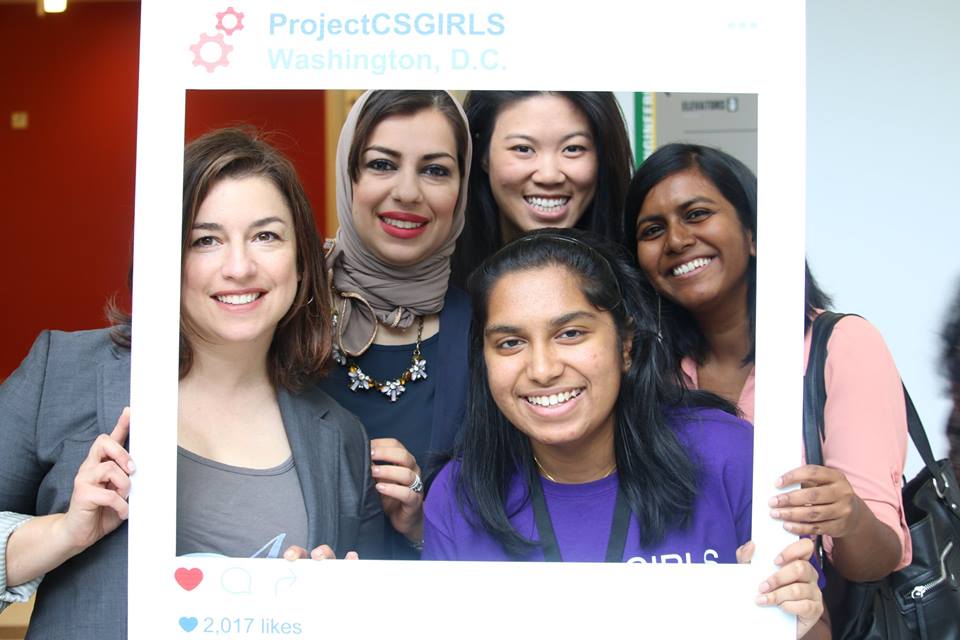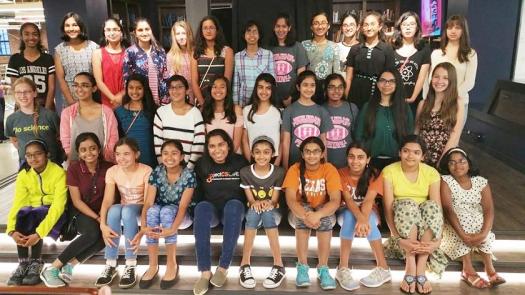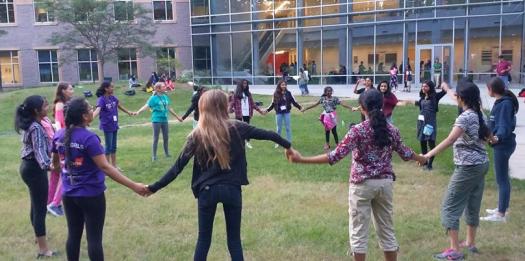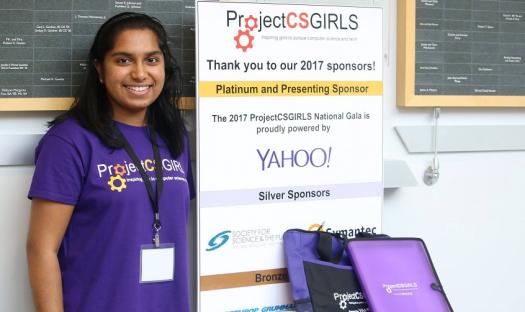Alumni, STEM Outreach, Young & Amazing
She founded a nonprofit in high school. Now, it’s going global.

Pooja Chandrashekar knows a thing or two about starting a nonprofit as a teenager. At 15, she founded ProjectCSGirls, a nonprofit that promotes computer science among young girls. Although she started on a smaller scale, she always hoped to eventually inspire girls worldwide to pursue computer science by making it an international organization.
Four years later, that dream is becoming a reality. ProjectCSGirls, which started as a regional competition in Virginia, Washington, D.C., and Maryland and grew into a national computer science competition for middle school girls, will now also offer workshops in countries around the world, starting with India, Sri Lanka, Germany, and France.
“This has always been an aspiration of mine, to build an international community,” Pooja said.

ProjectCSGirls has certainly grown from when Pooja started it as a sophomore in high school. To date, the organization has reached 2,500 girls in 50 states. Pooja, an Intel Science Talent Search 2015 semifinalist (now the Regeneron Science Talent Search), says the Society for Science & the Public has played a large part in ProjectCSGirls’ incredible growth.
Last month, the Society awarded a $5,000 STEM Action Grant to ProjectCSGirls, part of $120,000 in grants given to nonprofit organizations and teachers nationwide. Thanks to that STEM Action Grant, the 2017 ProjectCSGirls National Gala was a huge success, Pooja says.
We would not have been able to do the gala without the funding from the Society for Science & the Public.
The ProjectCSGirls Gala brings finalists from the organization’s national computer science competition for a weekend of panels, guest speakers, workshops, and an awards ceremony. It’s two days dedicated to exploring the concept of tech for social good.
“We would not have been able to do the gala without the funding from the Society for Science & the Public,” Pooja said.
Although ProjectCSGirls provided a stipend for attendees, Pooja says that there have been finalists in the past who couldn’t attend the gala because of the cost associated with coming to D.C. This year, for the first time, the STEM Action Grant provided by the Society made it possible for ProjectCSGirls to fund travel and accommodations for all finalists, allowing any girl, regardless of her financial situation, to attend the gala.

“Especially as an organization that focuses on encouraging more low-income and minority girls to participate, we understand that cost can prevent girls from taking part. Funding travel allows us to lift the burden as much as we can and encourage girls from all backgrounds to attend,” Pooja said.
Tech isn’t just software engineering — it can be merged with art, design, biology, any other field.
In addition to serving as a way to celebrate the incredible accomplishments of the middle school girls who participated in the national computer science competition, the gala provides a forum to discuss the importance of women in technology. This year’s event featured several high-profile speakers, including Megan Smith, who served as the third chief technology officer for the US, serving under President Barack Obama, and Margenett Moore-Roberts, Global Head of Inclusive Diversity at Yahoo.
“It’s a great way to open these girls’ eyes to the different kinds of possibilities that are available with technology,” Pooja said. “Tech isn’t just software engineering — it can be merged with art, design, biology, any other field of their choosing. The gala is meant to really hammer home this point that technology can be used in so many ways and to solve issues that are relevant to us and our community.”

That focus on tech for social good is a major component of the ProjectCSGirls competition. Participants are required to use computer science to build something that solves a social problem. This year’s projects were diverse, covering topics from environmental science to biomedical engineering. The first place winner developed an innovative software program that uses ultrasonic waves to reduce barnacle growth on ship vessels.
Pooja has certainly been keeping busy this summer. In addition to the gala and the upcoming unveiling of a new ProjectCSGirls website, Pooja is excited to reach more minorities and underrepresented girls through the launch of a chapter program. Since ProjectCSGirls began hosting workshops, Pooja says many high school and college students have reached out to her, asking how they can become involved. The new chapter program will allow these students to start a ProjectCSGirls chapter at their high schools or colleges. These chapters will be encouraged to reach out to low-income and minority middle school girls.
Technology can be used in so many ways and to solve issues that are relevant to us and our community.
Working to end the gender gap in computer science is no easy task. In her journey with ProjectCSGirls, Pooja has learned all about managing nonprofits, from adapting a regional program to a national and then international scale, to figuring out how to secure sponsorships (in addition to a sponsorship from the Society for Science & the Public, ProjectCSGirls is sponsored by companies such as Yahoo, Symantec, Northrop Grumman, and more). For teenagers interested in starting their own nonprofits, Pooja encourages them to “just go for it.”
“Remember to start small. When you have an idea, you have these really big aspirations. When I first went to my mentor and talked about ProjectCSGirls, I wanted to have this global program. But she told me, let’s start this on a small scale first, and then use what we learned to help build the program.”
Learn more about the Society for Science & the Public’s STEM Action Grants.
Pooja also recommends seeking mentors and talking about your idea with several people. Who knows? Maybe just four short years after starting your own nonprofit, you could be going global, too.


